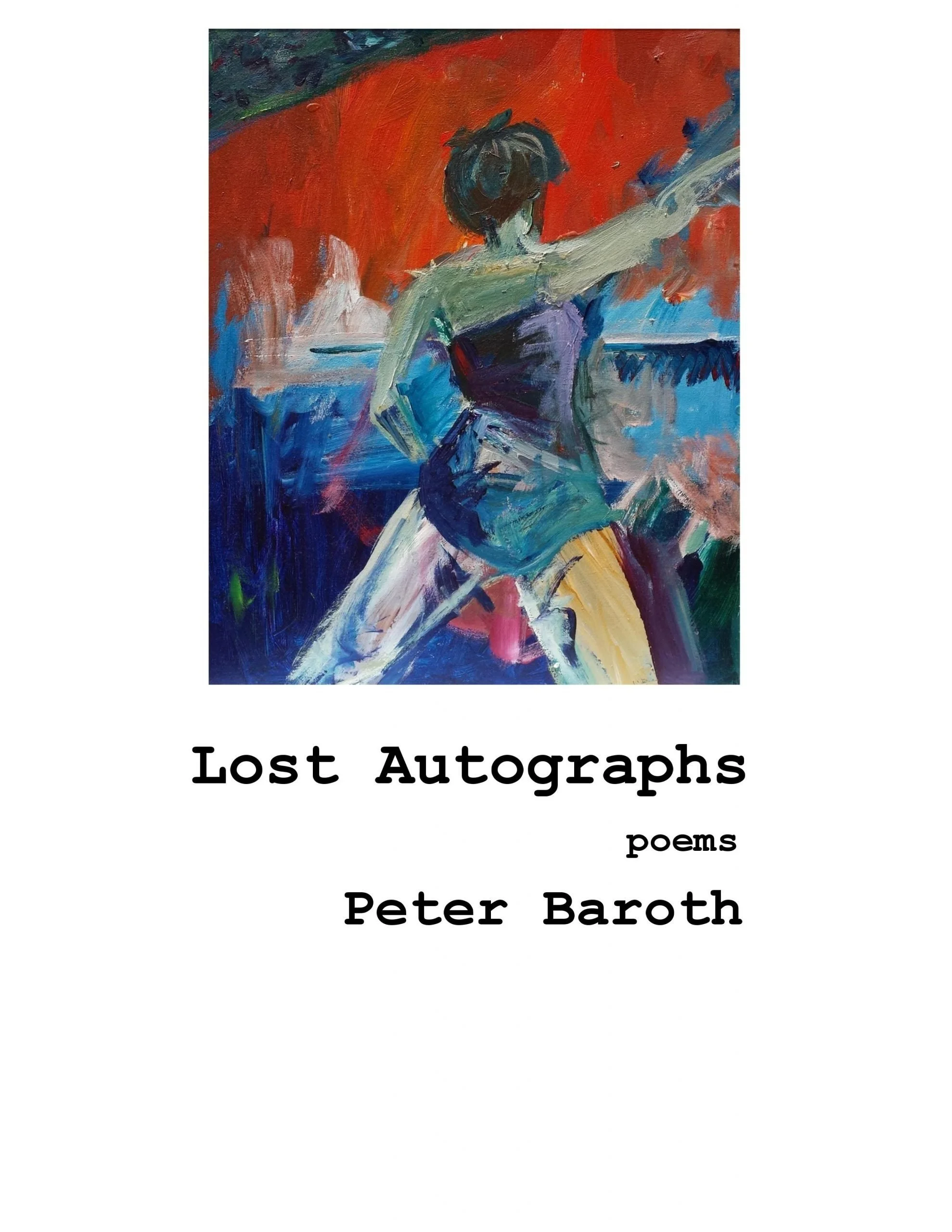Signatures and autographs are markings, regularly inked, of distinctive qualities and interpretations that are often just as much a reflection of the author as the recipient. Embodiments of current contexts as well as historical perspectives, the signature adopts numerous forms, whereas the autograph is often personalized and gifted. Peter Baroth’s deeply personal Lost Autographs has all the markings of the star quality often associated with the autograph. It’s a gift of a collection, and one that continues to give with each reading.
Lost Autographs, by Peter Baroth, was originally published in 2015 by Moonstone Press (and, I believe, recently reprinted in 2022). Throughout the collection’s 96 pages, Baroth invites readers into the folded ink of the narrator’s world and, simultaneously, writes as if the reader is the intended beneficiary of each narrative poem’s retold story. The intimate and deeply powerful collection is divided into three parts – origins, end/beginning, and travels.
Part I (origins) includes sixteen poems and explores a range of topics all linked through a historical lens that gifts autographed insights into the author’s youth and family. Select pieces include:
THE SEVENTIES
Yeah, that was the decade.
I was much older,
playing out my Dandy Don Meredith riffs
on the playing field.
My first goal, first French kiss, so many firsts.
THE CELLO
The cello was something that I started when
I was in the third grade
I chose it one day
THE PLANT
When I take I-95 to or from Philly,
I inevitably look for the Boeing Helicopter Plant,
the site of the last third of my father’s career.
EARTH MOTHER
What I know of my German grandmother
is shorthand and scant,
Dying as she did,
riding her motorcycle,
struck by a drunk driver,
nearly 30 years before my Chicago birth
Whether writing on a personal experience or of those known only through shared stories, Baroth’s masterful manipulation of the written word turns everyday experiences into extraordinary gifts that transcend time. The collection is an exercise in both presence and recollection.
Baroth’s remarkable ability to craft sparse language into richly detailed story is evident throughout the collection. Individual lines are like textured creases that offer multi-sensory experiences. Stanzas encourage readers to linger and appreciate a moment personally signed by an increasingly familiar voice sharing unfamiliar and signature experiences. It’s easy to lose oneself in each poem for an extended period and yet still pick up on new details with each subsequent reading.
Part II (end/beginning) includes eleven poems (several set in Philadelphia) that are simultaneously reminiscent and perfectly present. Each drops the reader in a moment strikingly real such that endings and beginnings blur and all that remains is now (or then). Pieces include:
JAZZ FOR JUSTICE ROBERTS
Makes me think of my time in West Philly,
Learning all of the Black Arts I did there,
he bongo sessions ‘til daybreak,
the relaxing pimps in their bars
at three in the afternoon
WHITE COATS
Well, I’ve been to the end of the United States
and what did I see?
A mirror of an ocean,
somehow a reflection of my soul
or perhaps of some recumbent deity above
PHILADELPHIA HIPSTER
But hey,
here comes the renaissance up Broad Street
Like a rusted rattling Yellow Cab barely under control.
Like a gliding, barreling Philadelphia Flyer
headed for the wall.
Because you know what?
You just sold your first painting!
Whereas Part II (end/beginning) pieces focus largely on Philadelphia, Part III (travels) includes eighteen pieces that take readers on a tour of extended sights and destinations. Pieces explore oceans (“CHILD OF THE ELEMENTS,” “A.C. OFF-SEASON,” “SUMMER SMILE”), airports (“PILOT’S LICENSE”), the South (“SOUTHERN SWING, FLORIDA”), the West (“MEDITATIONS ON CALIFORNIA AND HEAVEN,” “A LITTLE BIT OF THE DREAM”), and dialysis appointments (“DIALYSIS TEDIUM,” “THE SURVIVOR,” “THE BIG D”), with additional signature settings in between.
Like any good memory, the collection’s sum is indeed greater than the individual parts. The work has a rhythm both soothing and soul-searching. Both sweet and sour. Personal and memorable, like an autograph. With autographs left in near and far corners, the collection shines as it lingers.
In “OUTLAW FEELINGS,” the speaker writes:
She’s a lawyer now – Wendy – in Vermont,
I think. A gay marriage advocate,
God bless her,
and I’m still scribbling this finger candy
into little verses and doing not much else.
But if the snow’s nice this season,
I’d like to do a little skiing.
Finger candy indeed. In response, I close with a wish. A wish that Baroth continues to scribble, to spin narratives, and to share his signature work in autographed form. For readers of this blog, I can’t promise autographed copies of Lost Autographs, but you can gift yourself a copy here.
Jen Schneider is an educator who lives, writes, and works in small spaces throughout Pennsylvania. She loves words, experimental poetry, and the change of seasons. She’s also a fan of late nights, crossword puzzles, and compelling underdogs. She has authored several chapbooks and full-length poetry collections, with stories, poems, and essays published in a variety of literary and scholarly journals. Sample works include Invisible Ink, On Habits & Habitats, On Daily Puzzles: (Un)locking Invisibility, A Collection of Recollections, and Blindfolds, Bruises, and Breakups. She is currently working on her first series, which (not surprisingly) includes a novel in verse. She is the 2022-2023 Montgomery County PA Poet Laureate.


